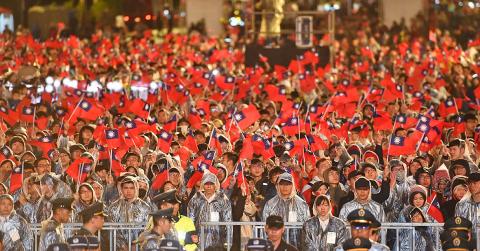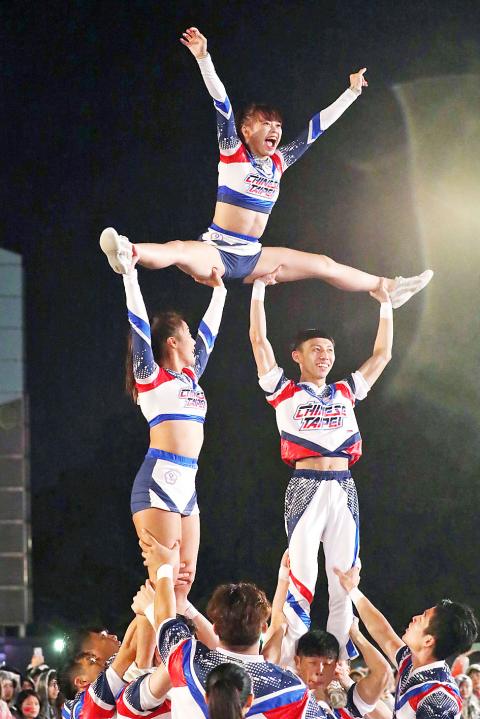President Tsai Ing-wen (蔡英文) yesterday proposed “four musts” as the basis for moving cross-strait relations in a positive direction, vowing to establish mechanisms to safeguard Taiwan’s national security.
China must recognize the existence of the Republic of China; respect the values of democracy and freedom Taiwan’s 23 million people hold dear; resolve cross-strait differences in a peaceful and equitable manner; and engage in negotiations with the government of Taiwan or an institution with a mandate from the government, Tsai said in her New Year’s Day speech.
These “four musts” are the vital basis for positive development of cross-strait relations, she said.

Photo: Liu Hsin-de, Taipei Times
The new formula appeared to be an attempt by Tsai to create a new starting point for relations with China, which have been at a standstill since her inauguration because of Beijing’s decision to cut off official communication with her administration.
It came one day before Chinese President Xi Jinping (習近平) is to deliver a speech on the 40th anniversary of a statement China first issued in 1979 that called for ending military confrontation with Taiwan and the opening of talks with Taiwan on expanding cross-strait exchanges.
Tsai yesterday rejected the view that the Nov. 24 elections, in which her Democratic Progressive Party (DPP) suffered stinging losses, were a rejection of her administration’s cross-strait policy.

Photo: CNA
The DPP administration was severely tested during the elections, but “I must emphasize that the election results absolutely do not mean that grassroots public opinion in Taiwan favors abandoning our sovereignty, nor do they mean that the people want to make concessions regarding Taiwanese identity,” Tsai said.
A drastic shift in the local political landscape after the elections has led the Chinese Nationalist Party (KMT) to push for cross-strait exchanges at the local government level based on the so-called “1992 consensus,” a format endorsing the “one China” principle that the Tsai administration has rejected.
Taipei Mayor Ko Wen-je (柯文哲) had reiterated at the Taipei-Shanghai forum last month his position that “the two sides of the Taiwan Strait are one family.”
Apparently referring to those positions, Tsai said that her administration was not opposed to normal cross-strait interactions or city-to-city exchanges, but that such exchanges would require the two sides to have a more realistic understanding of each other, including of the fundamental differences in their values, ways of life and political systems, so they can interact with each other in a healthy and normal manner.
China has been taking advantage of the openness and freedom of Taiwan’s democratic system to intervene in local politics and the development of society, but her administration would establish three mechanisms to ward off such threats, Tsai said.
The first would protect the livelihoods of Taiwanese, the second would enhance the nation’s national defense capability and the third would boost oversight and regulatory mechanisms for cross-strait interactions on issues that could compromise the nation’s sovereignty so as to consolidate its democracy, she said
Prior to her speech, Tsai attended a New Year’s flag-raising ceremony in front of the Presidential Office Building in Taipei.
Vice President Chen Chien-jen (陳建仁), Premier William Lai (賴清德), Legislative Speaker Su Jia-chyuan (蘇嘉全) and Taipei Mayor Ko Wen-je (柯文哲) were among the officials who participated in the ceremony — themed “Brave and Confident: One With the World” — in a steady drizzle and chilly winds.
Five newly naturalized citizens were invited to lead in the singing of the national anthem: US-born basketball player Quincy Davis, who plays on Taiwan’s national team; Turkish-born TV host Ugur Rifat Karlova; Lily Yang (楊萬利), a Burmese of Chinese descent; Tran Ngoc Thuy of Vietnam; and physician Peter Kenrick from Australia.
Performers at the ceremony included the Taipei Municipal Jianguo High School marching band, the team that represented Taiwan at the World Cheerleading Competition and the Feather Art of Drum and Dance troupe. The marching band won gold at the World Association of Marching Show Bands in Taipei in August last year and finished in the top three in the previous three years, while the troupe won gold at the Asian Percussion Festival in Tokyo in July last year.
The Taipei Municipal First Girls’ Senior High School marching band and a military honor guard also performed, as did the New Taipei City Junior Chorus, which won a silver medal at the World Choir Games in South Africa in October last year.
Some protests were also spotted during the ceremony.
Members of the Tax and Legal Reform League donned yellow vests and held up banners as they called for tax reform, while two pro-Taiwanese independence supporters carrying a flag that read “Deng Nan-jung [鄭南榕] — Taiwan’s national father” at a designated protesting zone in front of Jingfu Gate (景福門) called for Tsai to step down.
Deng was a democracy pioneer who self-immolated in 1989 in defense of “100 percent freedom of speech.”

The US government has signed defense cooperation agreements with Japan and the Philippines to boost the deterrence capabilities of countries in the first island chain, a report by the National Security Bureau (NSB) showed. The main countries on the first island chain include the two nations and Taiwan. The bureau is to present the report at a meeting of the legislature’s Foreign Affairs and National Defense Committee tomorrow. The US military has deployed Typhon missile systems to Japan’s Yamaguchi Prefecture and Zambales province in the Philippines during their joint military exercises. It has also installed NMESIS anti-ship systems in Japan’s Okinawa

‘WIN-WIN’: The Philippines, and central and eastern European countries are important potential drone cooperation partners, Minister of Foreign Affairs Lin Chia-lung said Minister of Foreign Affairs Lin Chia-lung (林佳龍) in an interview published yesterday confirmed that there are joint ventures between Taiwan and Poland in the drone industry. Lin made the remark in an exclusive interview with the Chinese-language Liberty Times (the Taipei Times’ sister paper). The government-backed Taiwan Excellence Drone International Business Opportunities Alliance and the Polish Chamber of Unmanned Systems on Wednesday last week signed a memorandum of understanding in Poland to develop a “non-China” supply chain for drones and work together on key technologies. Asked if Taiwan prioritized Poland among central and eastern European countries in drone collaboration, Lin

NO CONFIDENCE MOTION? The premier said that being toppled by the legislature for defending the Constitution would be a democratic badge of honor for him Premier Cho Jung-tai (卓榮泰) yesterday announced that the Cabinet would not countersign the amendments to the local revenue-sharing law passed by the Legislative Yuan last month. Cho said the decision not to countersign the amendments to the Act Governing the Allocation of Government Revenues and Expenditures (財政收支劃分法) was made in accordance with the Constitution. “The decision aims to safeguard our Constitution,” he said. The Constitution stipulates the president shall, in accordance with law, promulgate laws and issue mandates with the countersignature of the head of the Executive Yuan, or with the countersignatures of both the head of the Executive Yuan and ministers or

BACK TO WORK? Prosecutors said they are considering filing an appeal, while the Hsinchu City Government said it has applied for Ann Kao’s reinstatement as mayor The High Court yesterday found suspended Hsinchu mayor Ann Kao (高虹安) not guilty of embezzling assistant fees, reducing her sentence to six months in prison commutable to a fine from seven years and four months. The verdict acquitted Kao of the corruption charge, but found her guilty of causing a public official to commit document forgery. The High Prosecutors’ Office said it is reviewing the ruling and considering whether to file an appeal. The Taipei District Court in July last year sentenced Kao to seven years and four months in prison, along with a four-year deprivation of civil rights, for contravening the Anti-Corruption